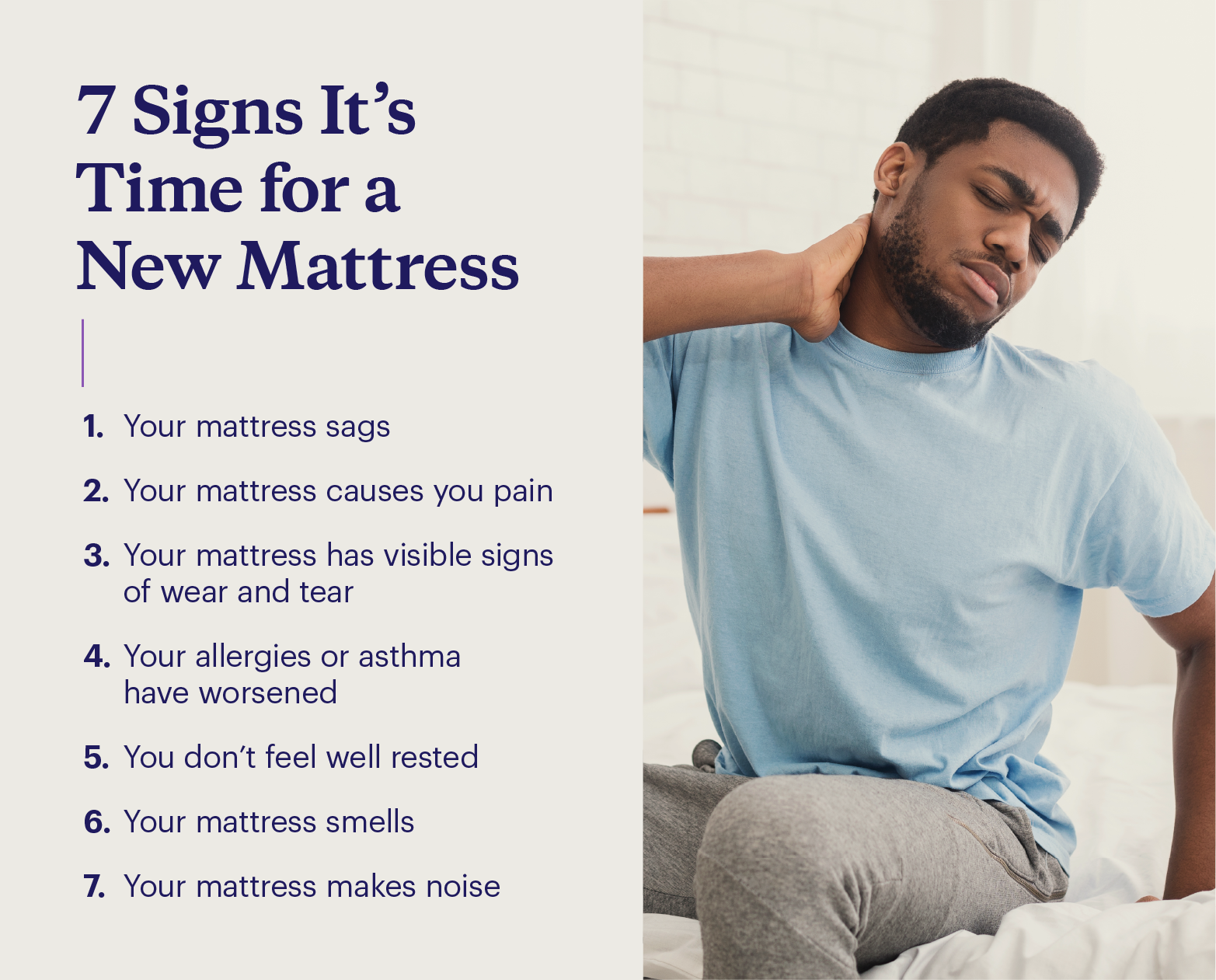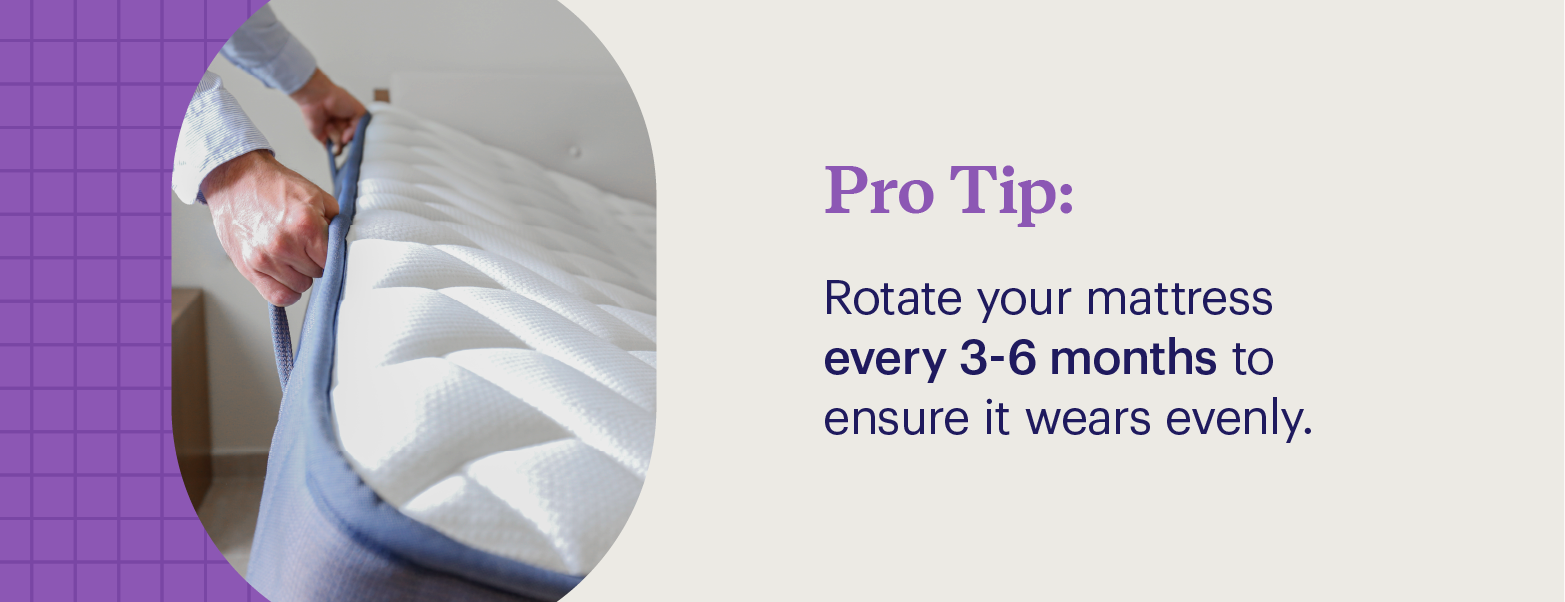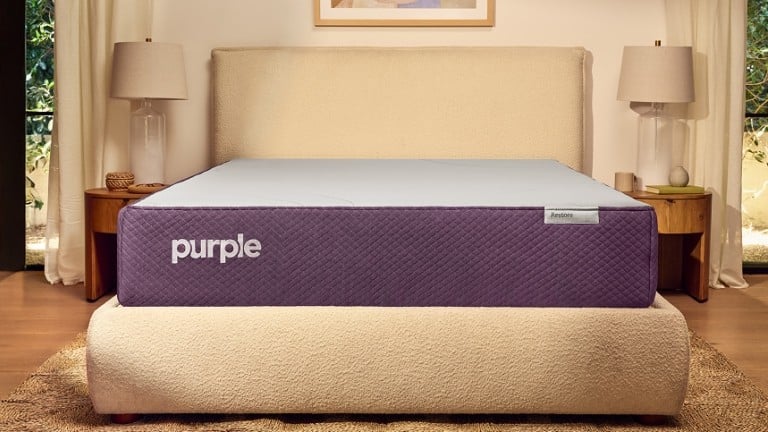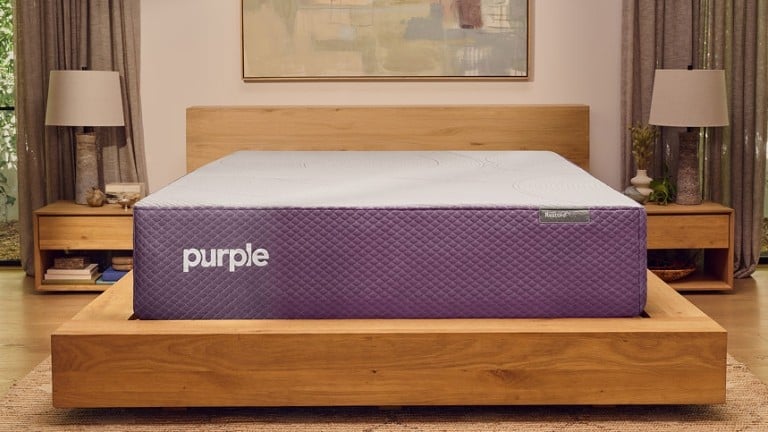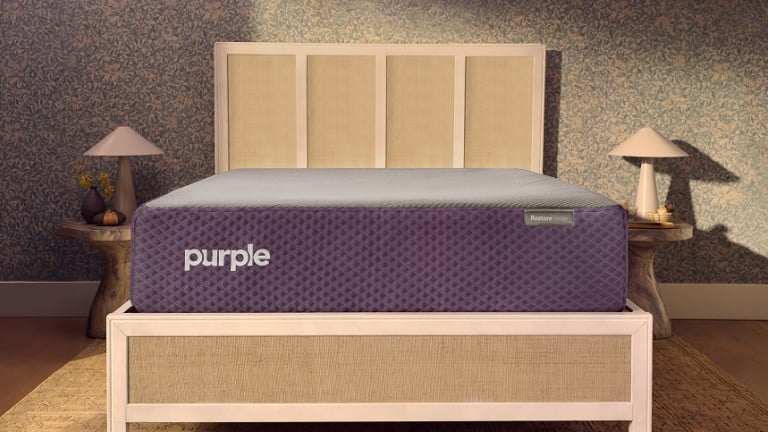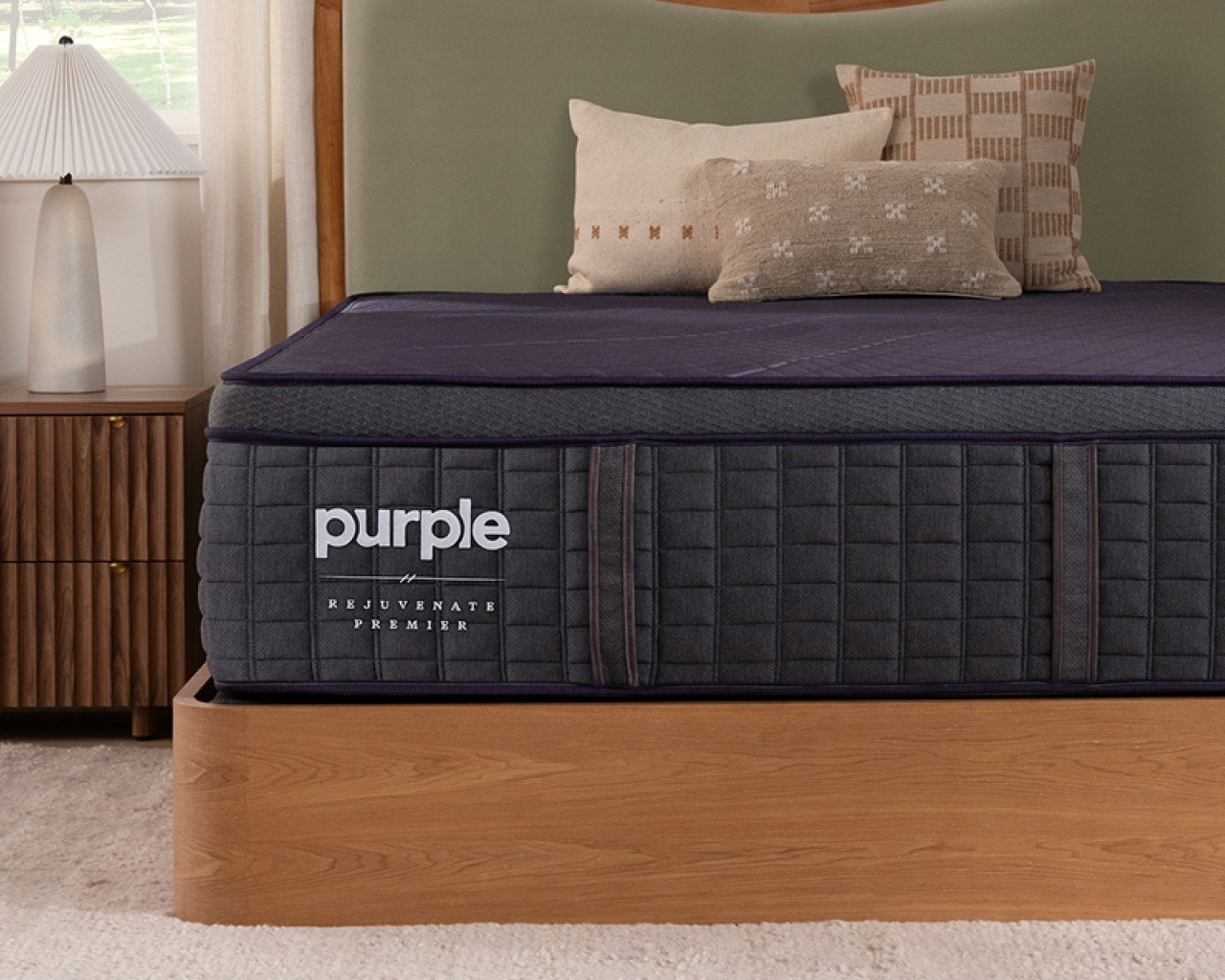
How Often Should You Replace Your Mattress? 7 Signs It’s Time
On average, mattresses should be replaced every 7-10 years. However, this is dependent on the specific mattress brand and materials, as well as how well you take care of the mattress.
With people spending nearly a third of their lives sleeping, it’s no wonder that your mattress plays a big role in not only your quality of sleep, but your quality of life.
So how often should you replace your mattress to ensure quality sleep and, therefore, a quality life? On average, a mattress lasts 7 to 10 years, but its lifespan ultimately depends on a variety of factors covered in this article. To start, the quality of the mattress materials, the specific user profile, and how well the mattress is taken care of will all play a role in how long a mattress will withstand.
Here are some of the telltale signs that it’s time to replace your mattress, plus ways to extend your mattress’s lifespan.
When To Replace a Mattress
How often you should replace your mattress depends on many factors. Usage, body type, sleep position, environment, and more will all play a major role in how long a mattress lasts. One of the most critical aspects of a mattress's lifespan is the type of mattress you choose — and what materials it’s made of.
Mattresses that are well maintained and made of high-quality materials shouldn’t need to be replaced until 10 to 15 years. Here’s how often you should expect to replace your mattress depending on the type or material.
| Mattress Type | Lifespan |
| Foam | 7-10 years |
| Innerspring | 7-8 years |
| Hybrid | 7-10 years |
| Latex | Up to 15 years |
| Adjustable | 6-8 years |
7 Signs You Need a New Mattress
If you’re wondering when to replace a mattress, the answer is probably sooner rather than later. From disrupted sleep to waking up sore, these are all signs of a bad mattress. The sooner you get a new mattress, the sooner you can sleep more soundly.
Here are some of the common indicators that it’s time for a new mattress.
1. Your Mattress Sags
A mattress that has begun to sag or has a permanent imprint from where someone usually sleeps is likely ready to be replaced. Though there are some ways to fix a sagging mattress, such as rotating the mattress or getting a firm mattress topper, it’s generally a sign that the mattress is nearing the end of its life.
2. Your Mattress Causes You Pain
An old mattress may gradually or even suddenly start to cause you pain. As mattresses age and wear, they can become less comfortable, causing back, hip, neck, and other joint pain. This is because old mattresses lose their shape and are no longer able to provide proper lumbar support.
3. Your Mattress Has Visible Signs of Wear and Tear
Your mattress may look ready to be replaced. Whether that means the mattress has yellow stains, the fabric is worn or ripped, the springs are jutting out, or you can actually see it sagging, visible wear and tear is a clear sign that your mattress is deteriorating and needs replacing.
4. Your Allergies or Asthma Have Worsened
If you’ve found yourself experiencing increased symptoms of allergies or asthma, such as watering eyes, runny nose, sneezing, or difficulty breathing, your mattress may be the culprit.
Mattresses may harbor sweat, dead skin cells, dust, and dust mites that build up year after year, especially if you're keeping your mattress in storage. So worsening allergies or asthma, particularly at night or after waking, can indicate that your mattress is ready for replacement. Purple’s Waterproof Mattress Protector is one solution to limiting and prolonging the negative impact of these allergy-inducing contaminants.
5. You Don’t Feel Well Rested
One of the often overlooked signs that it’s time to replace your mattress is a decrease in sleep quality. Waking up feeling unrested, whether due to back pain or flared allergies, is a sure sign that your mattress isn’t working for you anymore.
Restless sleep can be caused by a number of factors like low-quality mattresses or pillows or underlying health conditions. While the solution may be something as simple as adding more exercise to your daily routine, restless sleep resulting from an issue with your bed may require an investment in a new, quality mattress.
6. Your Mattress Smells
Sweat, dirt, and dead skin accumulating over the lifetime of a mattress, as well as other environmental factors such as high humidity, can lead to mold, mildew, and, you guessed it, odors in your mattress. Although there are some ways to deodorize a mattress — for example, baking soda works wonders — a mattress with unpleasant smells will need to be replaced sooner rather than later. Once again, Purple’s Waterproof Mattress Protector is a key solution to limiting these obstacles that negatively impact the longevity of your mattress.
7. Your Mattress Makes Noise
If your mattress is making noise and you’ve assessed your frame to ensure it’s not a loose screw or part, the noise could be due to age. This is particularly common in older innerspring mattresses, as the springs begin to wear out from regular use, bending, and even breaking.
Factors Affecting Mattress Lifespan
A wide variety of factors will impact the lifespan of a mattress. While mattresses slowly degrade over time with regular use, the quality of the mattress itself and how well you take care of it can extend its lifespan.
Here are some of the factors that impact a mattress’s lifespan.
Material
Mattresses made of high-quality materials are likely to maintain peak performance longer. Latex mattresses, for example, can reach 15 years, as they aren’t prone to sagging like their innerspring counterparts. Hybrid mattresses, such as the Purple Restore® Hybrid Mattress, can also maintain their quality longer than 10 years, as they’re designed to offer support that wears more evenly over time.
Maintenance
You should rotate your mattress approximately every three months to ensure it wears evenly. Additionally, mattresses should be cleaned twice a year by spot cleaning and vacuuming, along with other methods such as using vinegar or a stain remover to clean any stains.
User Profile
A single person will typically wear a mattress much slower than a couple or family sharing a mattress due to the added weight and subsequent strain on the mattress. Similarly, heavier people are likely to wear their mattresses more quickly. People who tend to sweat more in their sleep will also find that their mattresses may wear out more quickly than expected, as sweat can damage the material over time.
Pets and Kids
Both pets and kids can impact the wear rate of a mattress. Jumping on the bed, increased dirt and dander, and possible nighttime accidents can all influence how soon a mattress needs to be replaced.
How To Extend Your Mattress’s Lifespan
Although most mattresses need replacing after 10 years, there are some proactive measures you can take to ensure yours maximizes its lifespan, including:
- Use a mattress protector: A high-quality mattress protector safeguards your mattress from moisture, dust, dander, and other messes.
- Take proper care: Avoid jumping on your mattress to prevent wear and damage. Clean it once or twice a year using baking soda and a vacuum to ensure its longevity.
- Use the right foundation: Using the proper foundation or bed frame can prevent the mattress from sagging and wearing prematurely.
- Routinely rotate or flip: Rotate your mattress every few months. Some mattresses can also be flipped, but many mattresses with a top comfort layer are not designed to be flipped.
Pro tip: A mattress protector is one the simplest ways to protect your mattress and ensure it maintains its quality and value longer.
4 Reasons To Replace Your Mattress
So, how often should you replace your mattress? The short answer is it varies depending on the mattress itself and the care taken to either elongate or limit its lifespan. While there are many ways to improve a mattress's longevity, there are also many benefits of getting a new mattress, all of which will help improve sleep quality.
- Reduce aches and pains: Because mattresses may sag as they age and cause pain, a new mattress can help reduce back, hip, and other joint pain by providing better support.
- Improve allergies and asthma: Old mattresses have stored up years’ worth of dust, dander, and other allergens. A new mattress can help improve the symptoms of allergies and asthma.
- Less motion transfer: As mattresses wear, users may feel motion more as they or their partner move around at night. New mattresses are likely to have less motion transfer.
- Less mattress noise: Some old mattresses may make noise as they wear out, whereas a new mattress should not make any noise.
Looking to replace your mattress? Explore the difference between Purple mattress models to find the right fit for you, and learn why better sleep begins with Purple’s proprietary GelFlex® Grid.
FAQ
A mattress that is well taken care of may reach as long as 20 years; however, most mattresses should be replaced between seven to 10 years.
A mattress that is sagging, has visible signs of wear and tear, is causing you pain, or disrupting sleep should be replaced. Other signs that it's time to replace your mattress include odors, excessive noise, and worsening allergies.
The average lifespan of a mattress is 7-10 years. This is entirely dependent on how well the mattress is taken care of, as well as the specific material and brand of mattress.
Memory foam and gel memory foam mattresses should be replaced anywhere from 5-10 years, depending on the brand and quality of the mattress.
You should anticipate replacing your pillow every 1-2 years, depending on the type of pillow you use. Replacing your pillow on a regular basis ensures that you get the support and pressure relief you need to sleep comfortably without interruption.
The best time to buy a mattress is typically during major holidays. Mattresses often go on sale during holidays like Black Friday and Boxing Day, but also seasonally as new products come in, like in the new year or spring.
Mattresses are an investment. With mattresses lasting an average of seven to 10 years, you can rest assured that every penny spent is valuable for years to come. Mattresses vary in price depending on their quality, so you should be able to find a mattress that fits your needs and budget.
More to Explore
Level-up your sleep routine with our most-loved products.



